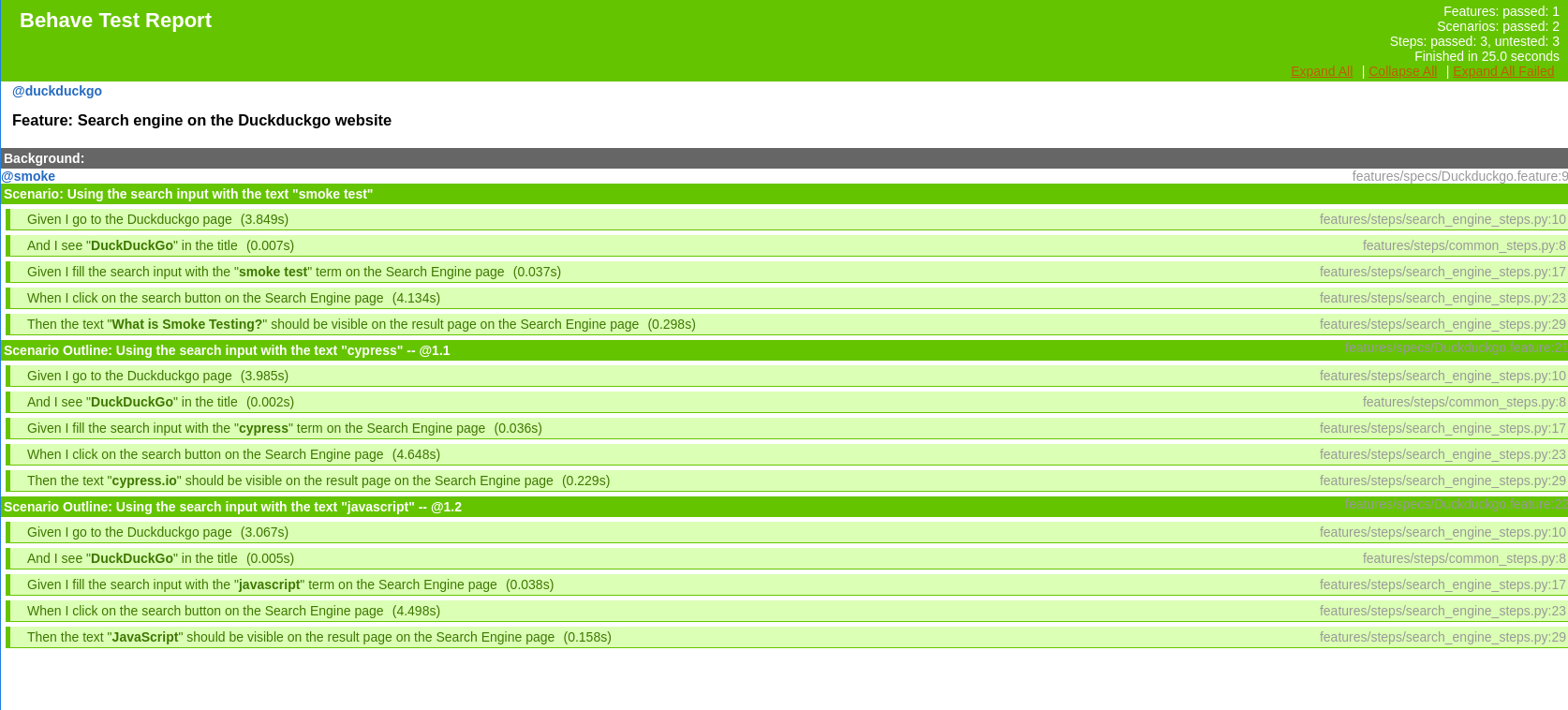Basic example of using Python with Behave (BDD). This Gherkin example includes:
- Basic Scenario
- Scenario Outline
- Tagged tests
python3 -m pip install -r requirements.txtpython3 -m behave@duckduckgo
Feature: Search engine on the Duckduckgo website # features/specs/Duckduckgo.feature:2
Background: # features/specs/Duckduckgo.feature:4
@smoke
Scenario: Using the search input with the text "smoke test" # features/specs/Duckduckgo.feature:9
Given I go to the Duckduckgo page # features/steps/search_engine_steps.py:10 3.849s
And I see "DuckDuckGo" in the title # features/steps/common_steps.py:8 0.007s
Given I fill the search input with the "smoke test" term on the Search Engine page # features/steps/search_engine_steps.py:17 0.037s
When I click on the search button on the Search Engine page # features/steps/search_engine_steps.py:23 4.134s
Then the text "What is Smoke Testing?" should be visible on the result page on the Search Engine page # features/steps/search_engine_steps.py:29 0.298s
Scenario Outline: Using the search input with the text "cypress" -- @1.1 # features/specs/Duckduckgo.feature:21
Given I go to the Duckduckgo page # features/steps/search_engine_steps.py:10 3.985s
And I see "DuckDuckGo" in the title # features/steps/common_steps.py:8 0.002s
Given I fill the search input with the "cypress" term on the Search Engine page # features/steps/search_engine_steps.py:17 0.036s
When I click on the search button on the Search Engine page # features/steps/search_engine_steps.py:23 4.648s
Then the text "cypress.io" should be visible on the result page on the Search Engine page # features/steps/search_engine_steps.py:29 0.229s
Scenario Outline: Using the search input with the text "javascript" -- @1.2 # features/specs/Duckduckgo.feature:22
Given I go to the Duckduckgo page # features/steps/search_engine_steps.py:10 3.067s
And I see "DuckDuckGo" in the title # features/steps/common_steps.py:8 0.005s
Given I fill the search input with the "javascript" term on the Search Engine page # features/steps/search_engine_steps.py:17 0.038s
When I click on the search button on the Search Engine page # features/steps/search_engine_steps.py:23 4.498s
Then the text "JavaScript" should be visible on the result page on the Search Engine page # features/steps/search_engine_steps.py:29 0.158s
1 feature passed, 0 failed, 0 skipped
3 scenarios passed, 0 failed, 0 skipped
15 steps passed, 0 failed, 0 skipped, 0 undefined
Took 0m24.990sHTML report:
python3 -m behave --tags=smokepython3 -m behave --tags='<EXPRESSION>'more details: running-tagged-tests
edit behave.ini:
...
[behave.userdata]
browser = firefox # <- CHANGE HERE - Available options: firefox | chrome
...edit behave.ini:
...
[behave.userdata]
headless = true # <- CHANGE HERE - Available options: true | false
...These are the linters that will help us to follow good practices and style guides of our source code. We will be using the following static analysis tools, which will be executed when generating a new push in the repository (git hooks).
After cloning the repository run the following command in the repository root:
git config core.hooksPath .githooksTools used:
-
brunette: A best practice Python code formatter.
-
isort: Python utility / library to sort imports alphabetically, and automatically separated into sections and by type.
-
prospector: Prospector is a tool to analyse Python code and output information about errors, potential problems, convention violations and complexity.
Tools executed by Prospector:
- pylint: Pylint is a Python static code analysis tool which looks for programming errors, helps enforcing a coding standard, sniffs for code smells and offers simple refactoring suggestions.
- bandit: Bandit is a tool designed to find common security issues.
- dodgy: It is a series of simple regular expressions designed to detect things such as accidental SCM diff checkins, or passwords or secret keys hard coded into files.
- mccabe: Complexity checker.
- mypy: Mypy is an optional static type checker for Python.
- pydocstyle: pydocstyle is a static analysis tool for checking compliance with Python PEP 257.
- pycodestyle: pycodestyle is a tool to check your Python code against some of the style conventions in PEP 8.
- pyflakes: Pyflakes analyzes programs and detects various errors.
- pyroma: Pyroma is a product aimed at giving a rating of how well a Python project complies with the best practices of the Python packaging ecosystem, primarily PyPI, pip, Distribute etc, as well as a list of issues that could be improved.
Tools used:
-
shellcheck: Finds bugs in your shell scripts (bash).
Installation:
apt install shellcheck
bash scripts/code_checkers.sh
